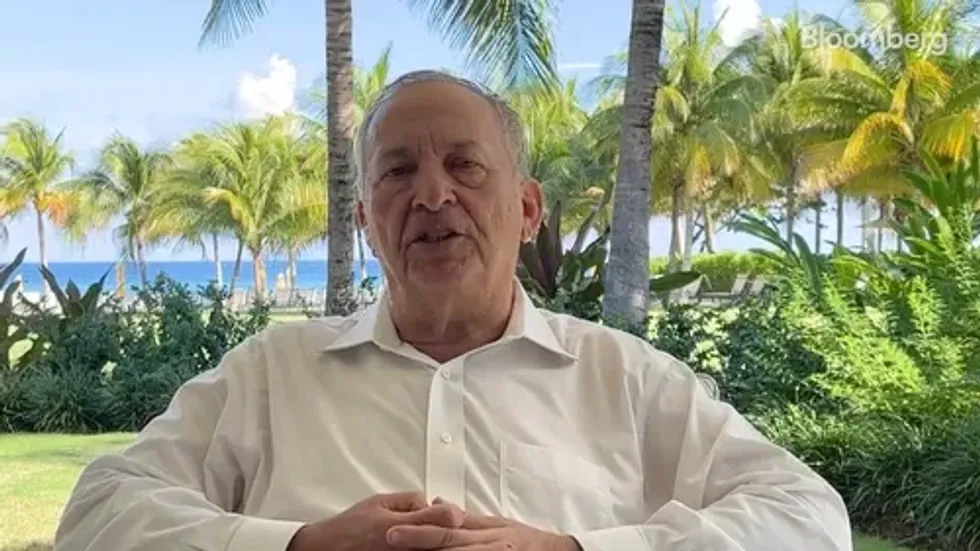
On Tuesday, Cameron Winklevoss publicly accused Barry Silbert, the CEO of cryptocurrency conglomerate DCG, of engaging in an elaborate fraud to illicitly pump up the bitcoin holdings of its subsidiary Genesis Global Capital. The Securities and Exchange Commission and Department of Justice have both opened early-stage investigations into DCG and Genesis, likely to look into similar claims.
While we of course condemn fraud and hope that any retail investors will be made whole, the Revolving Door Project doesn’t especially care if one crypto tech bro (Silbert) happened to follow in the footsteps of Mark Zuckerberg and dupe a pair of crypto tech bro twins (Winklevoss). We do care about the individuals who are left as collateral damage, and that the architect of the possible con (Silbert) was advised the whole time by another person with whom the Winklevoss twins have an infamous history: former Treasury Secretary Larry Summers.
It’s not as if Summers is difficult to reach, the man clearly loves to be quoted.
According to a book about the rise of Bitcoin, Silbert brought on Summers as an advisor to DCG in 2016 specifically to open doors for him and his company on Wall Street and in foreign banks. At the time, Bitcoin was still widely (and rightly) seen as a gimmick at best and a scam at worst, but Summers’ support for Bitcoin made DCG, and Bitcoin, appear more respectable to investors, journalists, academics, and regulators.
Summers worked with DCG for over six years. Particularly last year, during a high point for Bitcoin and crypto more broadly, he issued widely-reported public pronouncements about the crypto industry, including declaring that Bitcoin “is here to stay.” Summers also called for new regulation of the crypto industry, saying “I think it’s a recognition that all industries need to come to that are systemic in their importance.” This call for new, crypto-unique regulation is actually in line with figures like Sam Bankman-Fried’s strategy at the time to establish a crypto-specific regulatory regime. This would have both institutionalized crypto as a permanent and systemically important part of the financial system, and held it to a separate, likely softer, standard than run-of-the-mill securities. Very few journalists, especially in the mainstream non-crypto-focused media, ever disclosed Summers’ connections to one of Bitcoin’s most prominent businessmen while quoting his views.
In fact, DCG is just one of several crypto-related firms to which Summers lent his name and reputation. Now, as DCG and the broader industry implodes, Summers’ name has mysteriously vanished from the company’s website. The crypto news website Protos also reported that Summers quietly removed any mention of DCG from his personal website after being contacted by Protos about his sudden disappearance from DCG’s site.
Considering how much of the financial press eagerly solicits Summers’ take on every imaginable economics topic, it’s bizarre that no reporters have gotten his thoughts about his involvement in this crumbling company, and the asset class it promotes. Is anyone going to ask the former Treasury Secretary why he worked for years with a possible fraudster? What did he know, and when did he know it? If Winklevoss’ assertions prove true, how was the former Treasury Secretary fooled by Silbert’s scheme, which seems to have been pretty obvious self-dealing? How much due diligence does Summers conduct before sharing his name, status as former Treasury Secretary, and time with a corporation as a formal “Board Advisor”? What value did Summers believe DCG provided the world? Does he still think crypto has emancipatory potential? If not, when did his mind change, and why?
By all appearances, Summers is dancing the same dance with crypto as he did in the 90’s and 00’s with traditional finance: preach the gospel of ‘innovation’ while the music plays, then change into a sober-minded skeptic when the music stops. Sure, everyday people lose their life savings in the bubble while he’s feeding it, but the important thing to Summers is that his reputation remains intact.
This intact reputation appears to also be of value to the journalists who quote him, regardless of whether figures as distinct as Brooksley Born, Robert Reich, Christie Romer, and crypto skeptics have proven far more accurate.
It’s not as if Summers is difficult to reach, the man clearly loves to be quoted. The least the media can do before he next urges a higher unemployment rate while lounging on a tropical beach is to ask him some hard questions, as DCG appears to circle the financial and legal drain. Better yet, financial reporters should take this as an opportunity to finally learn that just because a man has a fancy title and talks like a walking thesaurus neither means he’s right, nor means he isn’t playing you for a fool.




